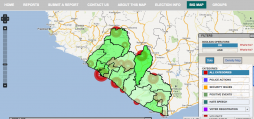Liberia
Posted by AnneryanHeatwole on Dec 03, 2011
On November 8, 2011, the Liberian President Ellen Johnson Sirleaf won her re-election campaign following a contentious runoff vote. In the October 11 general election, neither of the top two presidential candidates secured a majority vote –Johnson Sirleaf received 43.9% of votes and opposition candidate Winston Tubman received 32.7% of the nation’s votes. Johnson Sirleaf and Tubman were scheduled to participate in a November 8 runoff election; however, Tubman boycotted it saying that the first elections had been unfair; a claim international election observers dispute. As the only candidate, Sirleaf won the runoff despite a low 37.4% of eligible voters coming out for the second round (compared to more than 70% for the first round).
In light of the election’s tumult, MobileActive.org spoke to the National Democratic Institute and Ushahidi Liberia to learn more about their respective work in the country encouraging transparency and fairness through election monitoring and citizen reporting.
The National Democratic Institute and Ushahidi in the 2011 Liberian Elections
Elections can be rigged in many ways, and voter fraud is varied. For instance, ballots can be changed or manipulated, voters can be influenced through intimidation or bribes, violence can shut down polling stations, or ballots can be changed after the election before the results are announced. Technical difficulties can also influence an election by preventing voters from casting their votes or having those votes accurately counted; difficulties could include long lines, failure to open a polling place on time, or a lack of necessary supplies.
| Technology in the 2011 Liberian Elections: Mobiles, Monitoring, and Mapping data sheet 1787 Views |
| Countries: |
Liberia
|
Posted by AnneryanHeatwole on Sep 25, 2009
Uses of Mobile Phones in Post-Conflict Liberia data sheet 5279 Views
Author:
Michael L. Best, Edem Wornyo, Thomas N. Smyth, John Etherton
Abstract:
Liberia is a country emerging from years of protracted and devastating civil conflict. Left without any fixed line telephone infrastructure, it relies solely on the mobile phone for telephony. This study investigates the usage of mobile phones in this immediate post-conflict setting. In particular, the authors adopt the uses and gratification approach to media research, giving focus to both instrumental and intrinsic motivations for use. Mobile phone users in both the capital city of Monrovia and in various rural areas were surveyed using the Q methodology, which identified distinct perspectives within these urban and rural groups. Participants were then sorted into groups where each group contained users with similar perspectives on their mobile phones. These identified groups included sets of users who saw their phones as productivity enhancers, means of connectivity to family and friends, essential business tools, technological curiosities, and sources of personal security. The idea of a phone as a stylish object was markedly rejected, especially in rural areas. We contrast these Q-sort results from Liberia with previous work from Kigali, Rwanda, finding differences especially as related to security.

